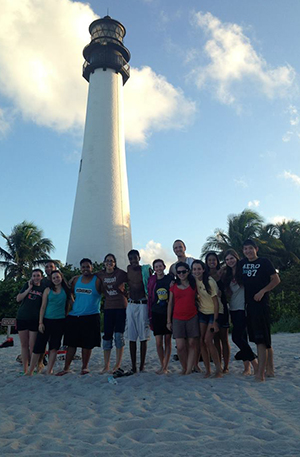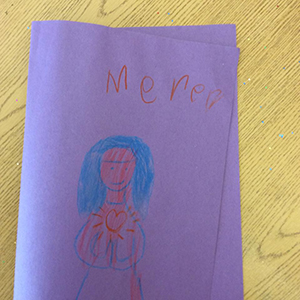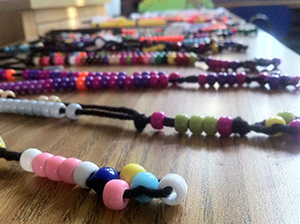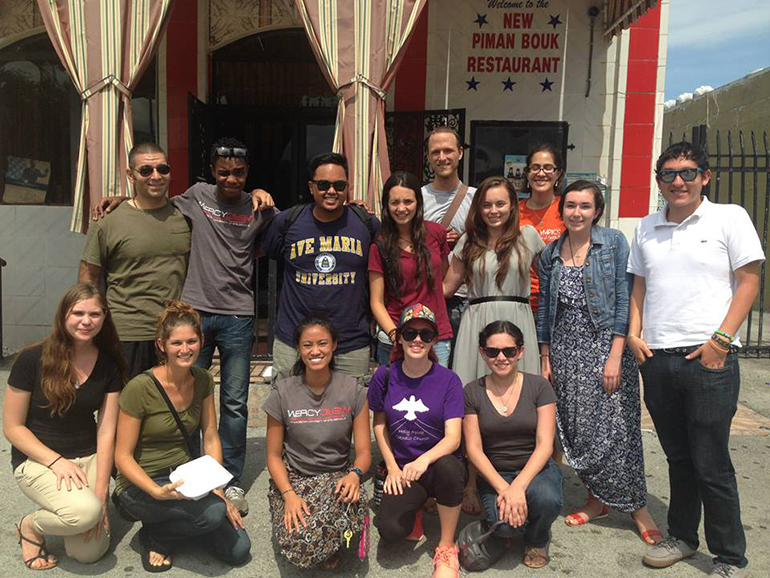
Our hearts were stretched to love unconditionally
Monday, October 20, 2014
*Blanca Morales

Photographer: COURTESY PHOTO
The team took some time out for fellowship one evening at Key Biscayne.
If Mother Teresa had lived in South Florida, we would have found her roaming the streets of downtown Miami, going out of her way to speak to the thousands of men, women and children who make up the city’s homeless and impoverished population.
Catholic social teaching is founded on the principle of the dignity of the human person, who is of infinitely more value than any material thing. The Church defends the well-being of all, especially the poor and vulnerable, who suffer not only from dire need but also from humiliation, powerlessness and hate crimes.
In his message for World Mission Sunday, which was celebrated Oct. 19, Pope Francis invites the laity to participate in the call to evangelization by going forth “to the peripheries … where a great number of the poor are awaiting” the Good News.
He goes on to emphasize that the joy of the Gospel is born of the encounter with Christ and from sharing with the poor.
This past year, many young adults in the Archdiocese were able to experience firsthand the joy of serving our brothers and sisters in Haiti, resulting in unforgettable missionary experiences.
Though I did not have the opportunity to travel abroad to do missionary work, I realized that there is much to do in our own backyard. I joined a group of 12 who spent a week serving the homeless and disadvantaged of Little Haiti.
We joined the Missionaries of Charity in their soup kitchen, helped at their annual cookout for underprivileged children, and organized a Bible summer camp at St Mary Cathedral School.
It was the most exhausting and challenging week of my life, but it was also incredibly wonderful.

Photographer: BLANCA MORALES | FC
A child drew a picture of Mary during Bible camp. The children all had a devotion to the Blessed Mother and loved to sing Immaculate Mary.
In Miami-Dade County, about 530,000 live in poverty, and thousands more are homeless. Arnell Lexima, a student from Palm Beach, was struck from the moment he arrived at the soup kitchen, feeling that he not only wanted to help the homeless but also understand them, and view them as brothers and sisters in Christ. “I realized their beauty that day,” he said.
It was also striking how a simple gesture such as a smile, a kind word, or even mere presence can mean so much to others. “I was in awe of how we, a group of strangers, came together as a team,” said Nick Higgins, who came down from Orlando.

Photographer: COURTESY PHOTO | Arnell Lexima
Children made rosaries for themselves and for children in Haiti, which were taken to that country by one of the mission trip teams.
When people are called to a common mission, great things happen. As a team, we prayed the Liturgy of the Hours, read meditations from Mother Teresa, attended daily Mass, ate breakfast and dinner together, and shared in fellowship. There was beauty and joy in living out community — helping each other out, encouraging one another, cooking together, laughing at our limitations, and learning from one another how to be creative or resourceful.
We learned from Mother Teresa that “a sacrifice, to be real, must cost, must hurt, and must empty us of ourselves.”
“Some of the children we served had been through a lot more in their childhood than any child should have to go through, so there was definitely a need for us to come out of our own selfishness and desires for comfort, and respond to this call to love them,” said Nick, who supervised summer camp activity.
God gave us “holy energy” — His Spirit kept us going despite frustration or tiredness. We learned to grow in patience. Our hearts were stretched to love unconditionally.
That week, I experienced the grace that comes from sacrifice, realizing that when you live for a purpose higher than yourself, where you surrender your own interests in order to selflessly love others, there is joy.
There is joy in a crowded soup kitchen.
There is joy in the blazing sun where children are having the time of their lives.
There is joy in sleeping on the floor for a week.
There is joy in eating peanut butter sandwiches every day.
There is joy in cooking in sauna-like kitchen.
There is joy when a child says you’re funny-looking.
There is even joy in chasing and spraying an army of roaches.
When you let go of all you were holding on to, the Lord fills you with his share of peace, love, and joy — lots of it. We give him five loaves and two fish (everything we have), and he gives us 12 baskets-full (innumerable graces) in return.
Mesi, Bondye, mesi.

Photographer: COURTESY PHOTO
After serving at the soup kitchen and attending Creole Mass on a Sunday, the group went to a Haitian restaurant for lunch. There was plenty of opportunity to immerse ourselves in Haitian culture.


Comments from readers